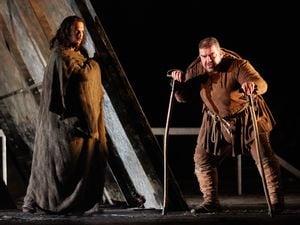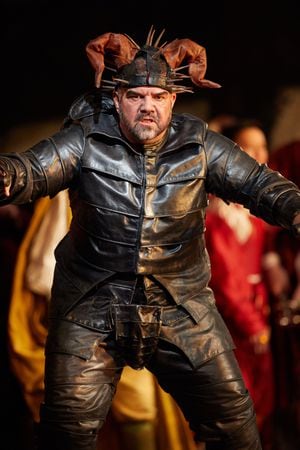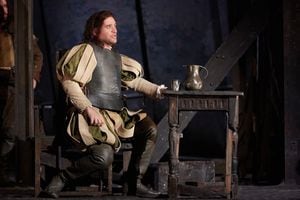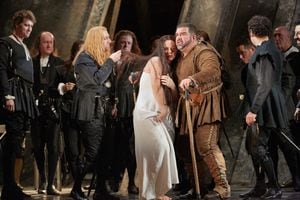Rigoletto, Market Drayton Festival Centre - review with pictures
Thank goodness for the colour and depth in Verdi’s beautiful music – and for the superb sound system at the Festival Centre which delivered it as if we were sitting in the centre stalls of Covent Garden’s Royal Opera House.

Because colour and depth were in short supply elsewhere in this unremittingly grim telling of a sordid, tragic story.
This was a revival of David McVicar’s production of Rigoletto, streamed live to us on its final performance in London.
It tells the story of the licentious Duke of Mantua and his jester Rigoletto, both of whom have been cursed by a courtier whose daughter was seduced by the Duke with Rigoletto’s encouragement. Rigoletto’s own daughter Gilda falls in love with the Duke, and when Rigoletto hires assassin Sparafucile to kill the seducer, Gilda sacrifices herself to save him.

Originally set in 16th century Italy, McVicar’s version suggests a timeless dystopia. The Duke’s palace looks like a post apocalyptic shard of The Shard, the courtyard in front where his orgies take place, like a back yard with a bit of scaffolding. It rotates between scenes to give us a hovel of a home behind torn iron mesh for Gilda and Rigoletto: it’s like a scene under a railway arch in Dickensian London.
The lighting, too, is London by gloomy gaslight. The costumes express a dull masculine sensuality. Leather chest plates abound. Rigoletto wears a plated black leather outfit that makes him look like an armadillo on steroids.

This Jester is all fool, his attempts to protect his innocent daughter as ill-advised as his subsequent consuming desire to wreak terrible vengeance. And Gilda? Abducted by his courtiers, seduced (raped?) and then betrayed by the Duke – still she lays down her life for him as she sings “Only one thing is divine: love which takes us to the realm of the angels.”
The one thing divine in this ever-popular opera is surely the music. Soprano Lucy Crowe’s Gilda sang with tender clarity in her beautifully inter-woven duets with baritone Dimitri Platanias (Rigoletto) and tenor Michael Fabiano (the Duke). Her solo ‘Caro Nome’ (Dearest Name) after meeting the deceiving Duke posing as a student, was exquisite. Fabiano’s swaggering ‘La donna è mobile’ (Woman is fickle) as he betrayed Gilda harked back to his earlier “We loathe fidelity like the plague; no one will stand in my way if I fancy a woman.” The haunting refrain as Rigoletto leaned over his daughter’s body was creepy horror.

Next up from the Royal Opera House is Puccini’s Tosca, streamed live to the Festival Centre on 7th February. Set in Rome in 1800, this opera, like Rigoletto, is built on a melodramatic plotline. It depicts torture, murder and suicide. And it contains some of Puccini’s richest, most lyrical arias -- in the service of a love story more wholesome than Rigoletto, if equally tragic.
By John Hargreaves





